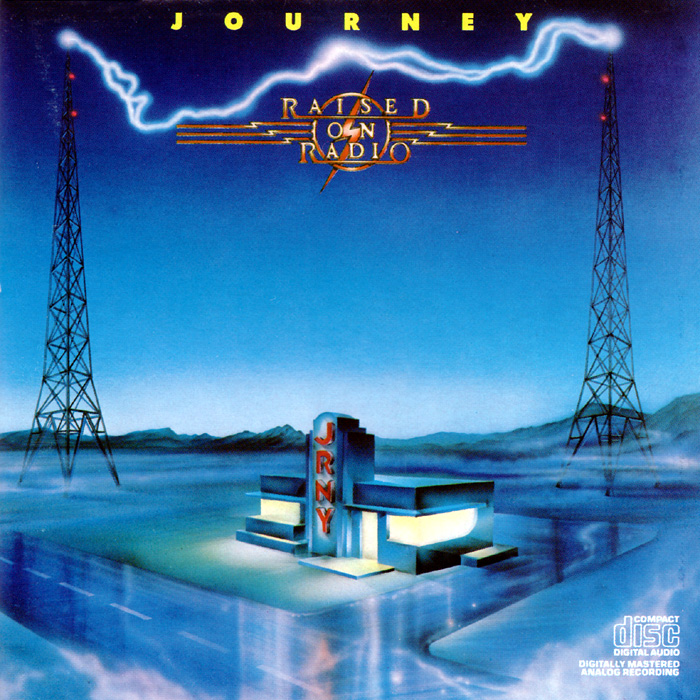
Raised on Radio (1986)

1. Girl Can't Help It
2. Positive Touch
3. Suzanne
4. Be Good To Yourself
5. Once You Love Somebody
6. Happy to Give
7. Raised on Radio
8. I'll Be Alright Without You
9. It Could Have Been you
10.The Eyes of a Woman
11.Why Can't This Night Go On Forever
To the casual observer, it may have seemed as though Journey were simply continuing their reign as purveyors of heartfelt anthems and FM-radio gold. In truth, the machine was beginning to seize. Following the monumental success of Escape and Frontiers, the band found itself physically drained, emotionally worn, and—for the first time—fragmenting. A much-needed hiatus ensued. Side projects appeared. Most notable among them was Steve Perry’s solo outing Street Talk, which proved both a commercial hit and a creative declaration of independence. So successful was Perry’s venture that, when he floated the idea of a follow-up in 1985, the record label—who, incidentally, also happened to handle Journey—applied the brakes. They preferred another Journey album first. So Raised on Radio was born, not out of inspiration, but obligation.
Perry returned to the fold, albeit with considerable reluctance. Now the undisputed captain of the ship, he promptly made executive decisions—starting with a change in rhythm. Longtime members Steve Smith and Ross Valory were unceremoniously dismissed. The band was pared down to its core triumvirate: Perry, Neal Schon, and Jonathan Cain. The result was something recognizably Journey in voice, but conspicuously different in character. The album sold well—no surprise, given the momentum and the voice attached—but the critical eye of hindsight has been far less generous.
The music, by and large, is competent. Occasionally, it’s even quite good. But it’s unmistakably not the same unit that once filled stadiums with rock thunder. Much of the edge had been smoothed away in favor of a polished, blue-eyed soul aesthetic, not unlike the sound Perry had explored on Street Talk. Unsurprisingly, his voice remained in fine form—soaring, emotive, and utterly distinctive—but the band behind him no longer sounded like a band at all. It was now a vehicle for Perry’s instincts, which leaned less toward guitar-driven rock and more toward mood and melody.
Consistency is not this album’s strong suit. There’s a sameness to the arrangements, a mid-tempo fog that drapes across much of the record. Still, the singles did their job. Be Good to Yourself, the lead track, offered a jolt of energy and optimism, even if it stood virtually alone in that regard. The rest—Girl Can't Help It, I'll Be Alright Without You, and Suzanne—fit snugly into adult contemporary playlists and served as gentle reminders that Journey could still tug at heartstrings when necessary.
But beneath the chart positions and glossy production, something vital had been lost. The urgency. The grit. The sense of a band pushing upward. By the time the supporting tour limped into its second leg, Perry abruptly departed—for reasons never entirely clarified. And with that, Journey disappeared. It would be nearly a decade before they resurfaced in any recognizable form.
Raised on Radio is not a bad record. It is, however, a transitional one—caught between the last echoes of glory and the silence that followed. The title evokes nostalgia, and perhaps rightly so, because what it truly marks is the end of the classic era.
Go back to the main page
Go To Next Review